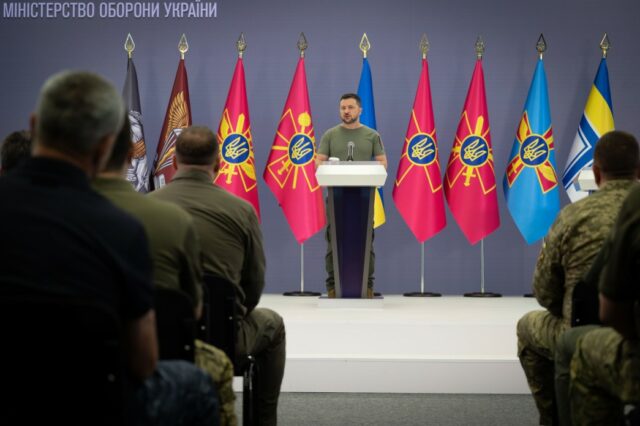
Ukraine’s New Defense Minister Has Difficult Road Ahead
Publication: Eurasia Daily Monitor Volume: 20 Issue: 143
By:

On September 11, Rustem Umerov, Ukraine’s newly appointed minister of defense, held his first conversation over the phone with his American counterpart, US Secretary of Defense Lloyd Austin. As stated in the press release following their conversation, the two officials exchanged their views on the priorities for supporting Ukraine’s immediate battlefield needs over the long term. They also discussed the agenda for the future meeting of the Ukraine Defense Contact Group in the Ramstein format (Defense.gov, September 11).
For Umerov, this is the beginning of a difficult process. The new defense minister replaces Oleksiy Reznikov who announced his resignation earlier this month on social media (Facebook.com/reznikovoleksii, September 4). On the surface, a change in defense minister while Ukraine is at war may seem puzzling. However, Umerov is not entirely new; he has already played a central role in arms negotiations on Kyiv’s behalf (President.gov.ua, September 3). Reznikov held the position for 22 months during perhaps the most difficult period in modern Ukrainian history. According to Roman Kostenko, a colonel of the Security Service of Ukraine and secretary of the Committee for National Security, Defense and Intelligence in the Verkhovna Rada (Ukrainian parliament), Reznikov was “a rather good minister.” Kostenko added that, under Reznikov, Ukraine came a long way from the “disposable grenade launchers” it possessed at the beginning of the war to the sophisticated weaponry now at its disposal. “Whether it is enough or not is another question. But his great merit is that we have it,” the Ukrainian colonel concluded (Suspilne, September 9).
Nevertheless, Reznikov’s time was marred by several corruption scandals related to government procurement practices for the Ukrainian Armed Forces. These included allegations of inflated prices for food being procured for the army (Economichna Pravda, January 23) and possible fraud in the procurement of critical military equipment (Zn.ua, August 10). None of these allegations have been proven, and no investigations by law enforcement are ongoing. Recently, after another alleged scandal, Reznikov even challenged a journalist to a bet if she could prove his guilt (Hromadske, August 25). Yet, the mere existence of such scandals has had a significantly adverse impact on Reznikov’s own image and that of the Ukrainian Ministry of Defense.
Thus, on September 7, Ukrainian President Volodymyr Zelenskyy officially introduced Umerov as the new defense minister. Among his key priorities for Umerov, Zelenskyy highlighted simplifying and digitizing bureaucratic procedures and enhancing medical assistance for soldiers (Mil.gov.ua, September 7). The Ukrainian president also zeroed in on improving coordination with Ukraine’s international partners, which will mean not only developing the already established formats of cooperation but also organizing new regional coalitions. Umerov declared that his priorities include zero tolerance for corruption, a harmonization of procurement procedures with North Atlantic Treaty Organization standards and the need to increase the efficiency and effectiveness of Ukraine’s defense production industry (Mil.gov.ua, September 7).
Umerov faces numerous international and domestic challenges. He must ensure the sustainability of Western weapons transfers, including Taurus and ATACMS long-range missiles and the much-anticipated F-16 fighters. He will also have to come up with an effective training approach for these systems. Umerov’s experience with international business and investment could help here. He is an experienced negotiator and participated in the talks with Russia on the return of Crimean Tatar political prisoners and Ukrainian prisoners of war from the Azovstal steel plant in Mariupol (BBC News Russian, September 4). Crimean Tatar leader Mustafa Dzhemilev lauded Umerov’s experience, declaring that he knows how to stand his ground and is an effective negotiator (Suspilne, September 6). According to Pavlo Lakiychuk, head of military projects at the Centre for Global Studies Strategy XXI, another potential advantage could be his Crimean origins. Umerov’s appointment may indeed be a signal to Kyiv’s international partners that Ukraine will not abandon the peninsula (Svoboda, September 10).
Some of Ukraine’s internal problems may prove difficult as well. A tough fight against corruption within the Defense Ministry lies ahead. Umerov is remembered for the absence of corruption scandals during his time as head of the State Property Fund of Ukraine. He has already begun confiscating Russian assets in the country to be used for the Ukrainian army’s needs (Suspilne, September 6).
Umerov will also be tasked with overseeing the replenishment of manpower on the front. The Ukrainian government is already beginning to take the necessary steps in this direction. Recently, the list of health conditions that restrict military service was revised, and the health requirements for airborne troops and marines were simplified (TSN, September 11). Additionally, Russian propaganda has been trying to negatively influence public perceptions of mobilization in Ukraine. The new defense minister has become the target of these disinformation campaigns. Some Russian outlets recently published a fake story about Umerov’s alleged proposal to lower the conscription age to 16 (T.me/pinffo, September 13). In reality, Umerov has declared maximum attention to the needs of the military, including more effective training for newly mobilized recruits before they are sent to the front. And he has proposed introducing a new position to the Defense Ministry—the “military ombudsman” (Mil.gov.ua, September 7).
It is yet early to assess Ukraine’s new defense minister and his approach to the problems that lie ahead. But one thing is certain: Umerov’s ability to maintain what has been effective thus far and to overhaul what has not will be critical to Ukraine’s success in pushing Russian forces out and restoring its territorial integrity.



